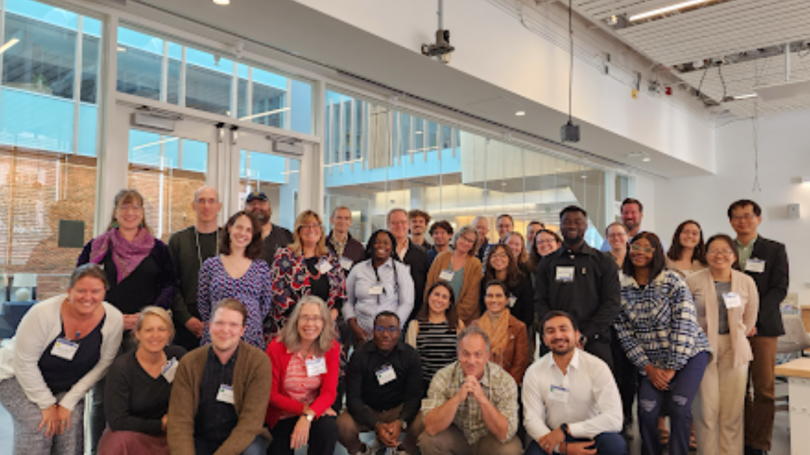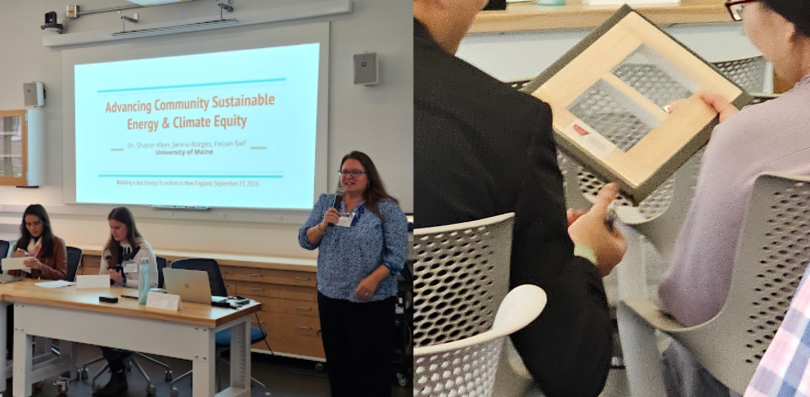

Over two days at the Arthur L. Irving Institute for Energy and Society at Dartmouth, four leading academic institutions—Dartmouth, the University of Massachusetts Amherst, the University of Maine, and Vermont Law and Graduate School—joined forces for a workshop focused on a just energy transition in New England. Held on September 27 and 28, the event brought together more than 60 participants, including academics, government representatives, nonprofit leaders, community stakeholders, and students. The event was made possible with funding from the University Energy Institute Collaborative (UEIC).
"This is a wonderful way to connect with a variety of academics, practitioners, and other dedicated folks who are working to foster a just energy transition in New England." – Workshop Attendee
Throughout the workshop, panel discussions and breakout sessions featured experts who delved into various aspects of energy justice, community partnerships, and policy strategies. This event also featured the work of Dartmouth's Energy Justice Clinic (EJC) and collaborations with professors and students and community partners. Dr. Sarah Kelly, who leads the EJC and several research projects featured in the workshop noted: "Our panel on the energy burden showcased the local organizations like LISTEN, COVER, and Lebanon Energy Advisory Committee who are committed to making sure no one is left behind in the energy transition."

One of the highlights was a session led by Sharon Klein, associate professor of economics and faculty fellow at the Mitchell Center for Sustainability Solutions at the University of Maine. Klein emphasized the importance of building trust and long-term relationships with local communities, particularly with the Wabanaki tribes, to develop sustainable energy solutions. Her experience working on window insert builds and community-led solar projects demonstrated the power of localized action.
Jenny Carter, professor of law and staff attorney at Vermont Law and Graduate School discussed net-zero affordable housing projects, emphasizing that a just transition must include energy-efficient, affordable housing options for low-income and rural residents. Her insights on integrating modular housing and leveraging tax credits highlighted the need for innovative yet practical solutions.
Dana Clawson, environmental sustainability coordinator for Hartford, VT, and Tad Montgomery, energy facilities manager for Lebanon, NH, emphasized the complexities of building energy resilience in small, rural communities, stressing the importance of state and federal support. There is a need to ensure that programs like the Inflation Reduction Act (IRA) and other federal support measures are accessible to all. Discussions highlighted the importance of reducing bureaucratic hurdles and creating clearer pathways for low-income and marginalized communities to benefit from these programs.
The role of Energy Navigators and similar frontline workers emerged as a vital component in the clean energy transition. Programs such as NH's Energy Circuit Rider and MA's Environmental Justice Council showcase the impact of having dedicated individuals within communities to advocate for and educate residents. These leaders help bridge the knowledge gap, ensuring that community members understand and access the benefits available to them.
In addition to panel discussions, the workshop facilitated valuable networking opportunities and hands-on activities, such as service-learning sessions led by Professor Klein. Former students Solomon Agbesi and Christopher Yalley shared their experience working on energy resilience strategies for Orono, ME, applying classroom knowledge to tackle real-world issues like backup power systems during severe storms.
A key takeaway from the event was a shared recognition that for a just energy transition to be successful, it must be co-designed with community partners, especially those representing marginalized communities. The importance of developing and sharing local solutions, such as community power and solar programs, was underscored, along with the need for clear communication and collaboration between stakeholders—from policymakers to residents.
"I truly enjoyed this opportunity to connect with students and professionals in the energy transition space at this workshop! I am left inspired by the conversations and presentations from this weekend, and am hopeful to see how many small-scale energy improvement projects are making a measurable impact in New England." – Workshop participant
Ultimately, building the momentum for community-university partnerships in energy transitions requires webs of relationships like those that were strengthened during the workshop. The Institute thanks the work and inspiration of Dr. Sarah Kelly and Building Engagement Manager Molly Dunn, who together masterminded the event.